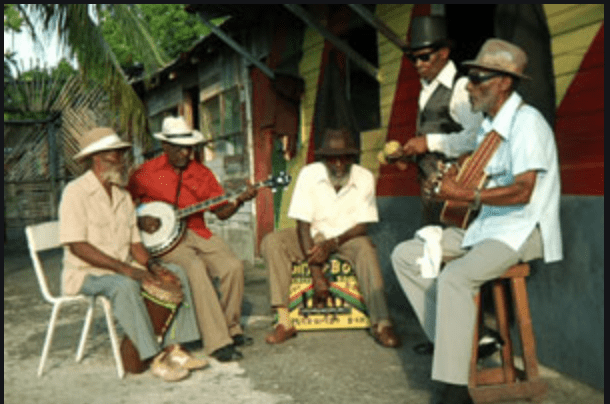The Jolly Boys were pioneers of a folk music phenomenon. Their music opened the doors for genres to come.
The Jolly Boys are a Jamaican band most famous for their Mento sound. Errol Flynn is responsible for the birth of the band. in the early 1940’s, He bought an island near Port Antonio in jamaica. Flynn loved throwing parties on this island. These parties were always accompanied by rich mento music preferably produced by mento bands. He developed a particular liking to a band called The Navy Island Swamp Boys, to whom he nicknamed The Jolly Boys. The rest was history. The Boy’s sound was dispersed all throughout Port Antonio. They would play in hotels for tourists usually with a performer or dancer. They grew as the tourism industry in Jamaica did. They became a Jamaican trademark. The band is now comprised of five members all over the age of seventy: Edbergt Watson plays banjo, Joseph “Powda” Bennet rattles maracas, Derrick “Johnny” Henry plays the rumba box, Allan Swymmer beats the bongo, all while lead singer Albert Minott sings and plays acoustic guitar. This group has seen at least 19 members come and go, but Derrick “Johnny” Henry has been the only unwavering member.

Mento music is essentially Jamaican folk music. According to lead singer Minott it is “country folk music”. The Mento instruments are the banjo, rumba box, saxophone, and the bongo. The mento sound had African roots with European and Celtic aspects. Jamaican slaves were forced to serenade their masters with the mento sound they created. As the slaves played and heard this music, they would reclaim it by singing the songs in the sugar cane fields as they worked. Mento music has since been phased out with the emergence of musical technology. Mento music is the foundation of the Jamaican music we appreciate today, such as Reggae, Dancehall, and Calypso. But there is much controversy surrounding Mento’s appreciation as a genre. Some believe that the purpose of mento celebrates the enslavement of blacks. Others such as the Jolly Boys are one of mento’s only pioneers struggling to continue its legacy. On the left you can hear traditional mento music, and on the right is traditional mento music by the Jolly Boys.
Due to the controversy around mento music as well as the technological advancements in music, the mento sound along with the Jolly Boy’s legacy is dying. Most Jamaican citizens do not even know that they exist. In efforts to resurface and keep the mento sound alive, they make covers of popular songs. These covers involve traditional mento instruments with modern lyrics. They have been and will continue to be advocates for the music that has brought them so much joy.

Login to your account